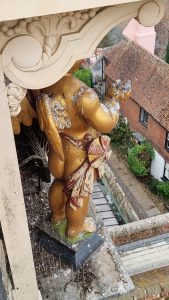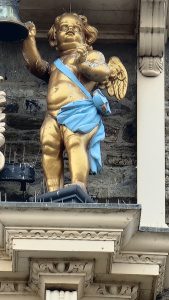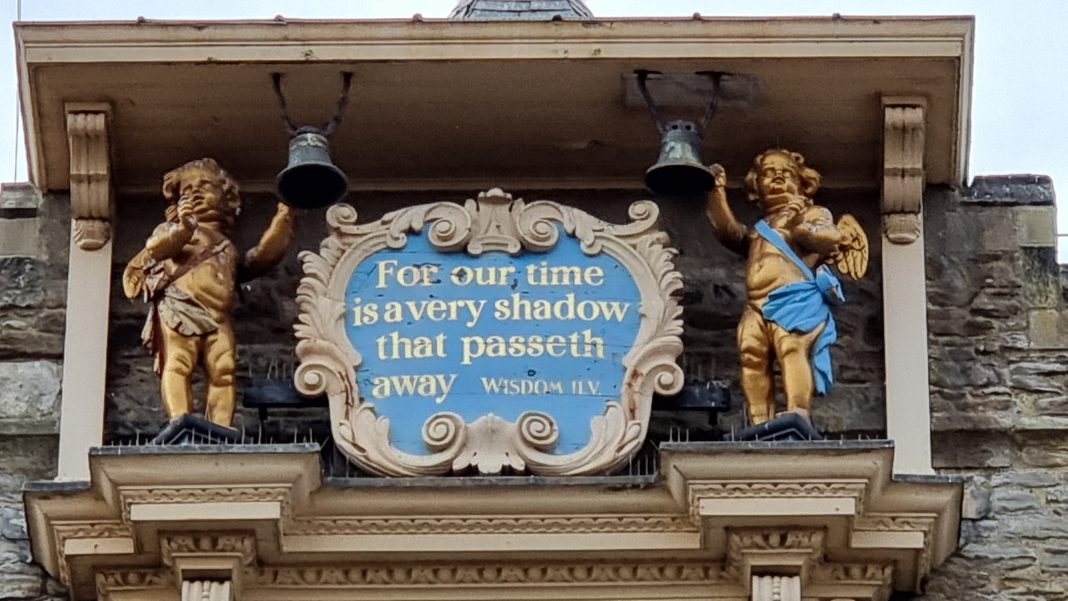Last week, I paused in Lion Street to explain to a group of visitors that there was no point waiting for the Quarter Boys on the St Mary’s clock to strike because they would not.
Back in 2019 one of the link rods broke and when the mechanism was inspected by one of the Cumbria Clocks team it was found to have several small faults and repairs were authorised. There was to be a delay because the company was fully occupied renovating the clock in the Elizabeth Tower of the Houses of Parliament – but then Covid struck, and so for nearly three years the Boys have been on strike, or not striking, whichever way you choose to look at them.
But finally, a replacement for a missing bolt has been made and the connecting rods and the stabilising wires for the bells have been replaced, so the Quarter Boys are back in action.
The quarters sound much more clearly and cleanly after their restoration – whether you like them or not! And our many visitors can once again watch them in action, although to be truthful there isn’t much to see unless you climb the tower to view the internal mechanism, which dates from 1760 and is two hundred years younger than the main clock.
The next step is to give the Boys a new coat of paint after cleaning off the mess left by generations of pigeons.

 What then is the Wisdom referenced under the clock’s inscription? Previously the inscription read “Tempus Fugit”, together with the names of two churchwardens. This confused one old Ryer who, returning to the town after an absence, declared that, although he knew two of the names, he wasn’t aware that there had been a churchwarden called Tempus Fugit. The idea that time is a shadow is perhaps more appropriate for a sundial than a clock facing North.
What then is the Wisdom referenced under the clock’s inscription? Previously the inscription read “Tempus Fugit”, together with the names of two churchwardens. This confused one old Ryer who, returning to the town after an absence, declared that, although he knew two of the names, he wasn’t aware that there had been a churchwarden called Tempus Fugit. The idea that time is a shadow is perhaps more appropriate for a sundial than a clock facing North.
The quotation comes from the Wisdom of Solomon, part of the Apocrypha which Luther described as “books which are not regarded as equal to the holy Scriptures, and yet are profitable and good to read.” The phrase in its context is, I think not so true of our late Queen Elizabeth, of whom much will be remembered, but I like the last part:
“For we are born at all adventure: and we shall be hereafter as though we had never been: for the breath in our nostrils is as smoke, and a little spark in the moving of our heart: Which being extinguished, our body shall be turned into ashes, and our spirit shall vanish as the soft air, And our name shall be forgotten in time, and no man shall have our works in remembrance, and our life shall pass away as the trace of a cloud, and shall be dispersed as a mist, that is driven away with the beams of the sun, and overcome with the heat thereof. For our time is a very shadow that passeth away; and after our end there is no returning: for it is fast sealed, so that no man cometh again. Come on therefore, let us enjoy the good things that are present: and let us speedily use the creatures like as in youth. Let us fill ourselves with costly wine and ointments: and let no flower of the spring pass by us: Let us crown ourselves with rosebuds, before they be withered.”
Image Credits: Andrew Bamji .




Glad the boys are back. Needs a little tweaking though, the bells were struck at 13 minutes past the hour.